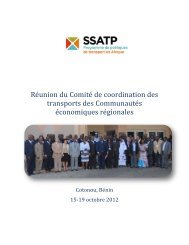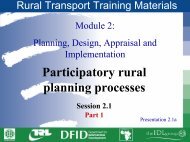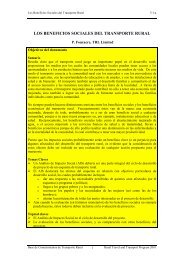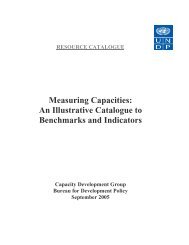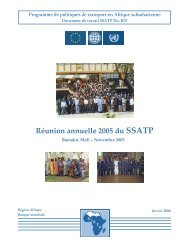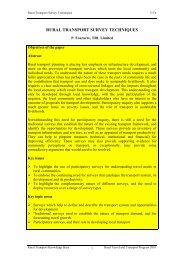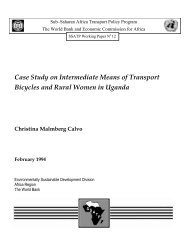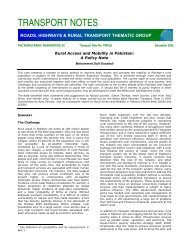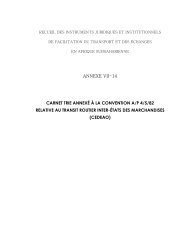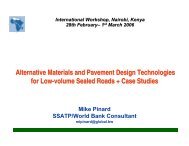Urban Transport - World Bank
Urban Transport - World Bank
Urban Transport - World Bank
You also want an ePaper? Increase the reach of your titles
YUMPU automatically turns print PDFs into web optimized ePapers that Google loves.
There was also a mention that corruption took a toll and funds were not used optimally due to<br />
high levels of corruption in some cities.<br />
With regard to financing of the lead transport agencies, it was mentioned that STIF, in Paris, is<br />
allowed to use some portion of employment tax for its administrative expenses. In London, the<br />
TfL collects a congestion charge and also parking fees. In addition there is financing provided by<br />
the national government. LAMATA too in Nigeria is allowed to retain a small fee on the road<br />
projects it is required to manage, to meet its administrative costs and the costs for some of the<br />
studies that it needs to carry out from time to time.<br />
The meeting agreed that there are several models available for adequate funding of the<br />
institutions that would be responsible for coordinating and managing the urban transport related<br />
activities. The model best suited to a particular context needs to be used and there is no single<br />
model that is universally applicable.<br />
Funding of actions to mitigate the impact of urban mobility on climate change is particularly<br />
important in the context of sustainable transport. One participant provided the recommendation<br />
to look at the additional cost to be green in urban transport to facilitate access to green funds.<br />
With regard to the role of SSATP, it was generally agreed that SSATP needs to help develop<br />
capacity about a fiscal framework for urban transport covering central and local governments<br />
and municipalities and make the relevant global information available to all countries. SSATP<br />
was requested to develop models of funding mechanisms for urban transport in particular<br />
identifying categories of costs that can be covered by public funds and conditions under which<br />
cities can access public funds for urban transport and provide support to countries to pilot these<br />
models. One specific model would explore the financing aspects of Public-Private Partnership<br />
for urban transport.<br />
In addition SSATP would have a very important role in advocacy and sensitizing the top political<br />
leadership to the global best practices in financing public transport as well as the lead institutions<br />
that need to be set up. This covers in particular considerations about fiscal transfers within the<br />
sector by adopting a system approach rather than a modal approach, and the financial<br />
consequences of applying various policies in terms of market conditions (full liberalization,<br />
competition for the market, competition within the market). This advocacy work would also<br />
include establishing benchmarks related to financing aspects of urban transport and monitoring<br />
performance of countries against these benchmarks.<br />
Other aspects<br />
A number of recommendations were provided by the participants, which complement the<br />
discussions in the three areas above:<br />
- The participants suggested that SSATP work on the role of planning as a critical activity<br />
for the success of improving urban mobility.<br />
- Regional Centers of knowledge would need to be set up to preserve the knowledge and<br />
make it available to underpin development and implementation of urban transport<br />
policies, institutional frameworks and operations in African countries.<br />
8






